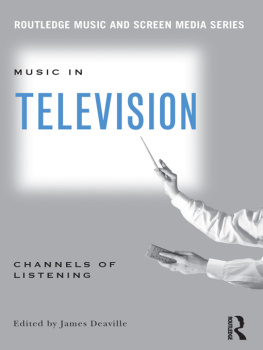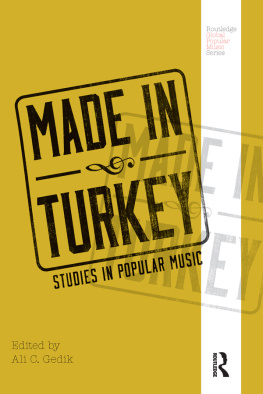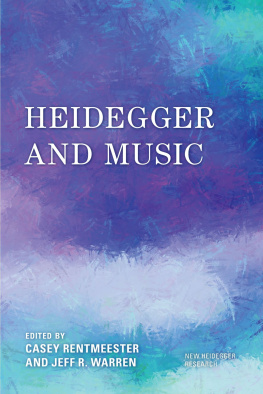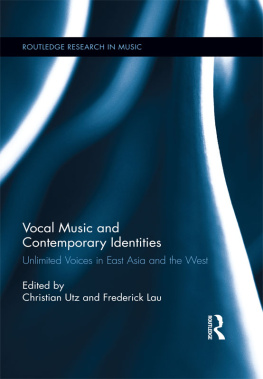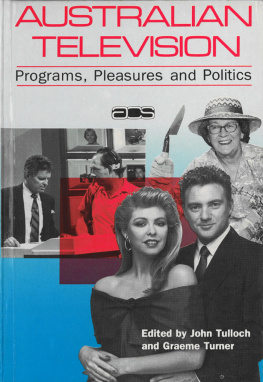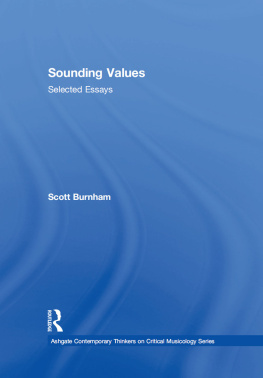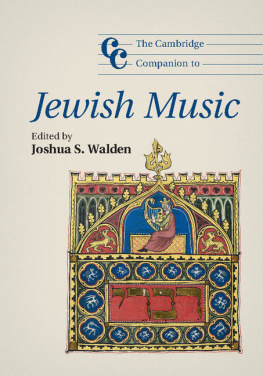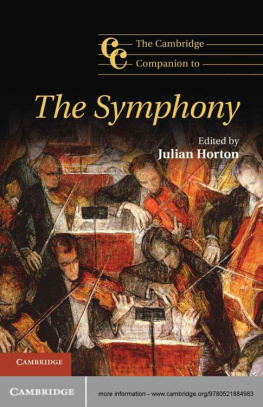Music in Television
Music in Television: Channels of Listening is a collection of essays examining televisions production of meaning through music in terms of historical contexts, institutional frameworks, broadcast practices, technologies, and aesthetics. It presents the reader with overviews of major genres and issues, as well as specific case studies of important television programs and events. With contributions from a wide array of scholars, the essays range from historical analytical surveys of television sound and genre designations to studies of the music in individual programs, including South Park and Doctor Who . It is the first essay collection to go behind the programs to uncover how particular televisual practices and programming reflect the political, social, and cultural conditions of their production.
Contributors : Adam Berry, Julie Brown, Norma Coates, James Deaville, Claudia Gorbman, Sean Nye, Kip Pegley, Ron Rodman, Colin Roust, Michael Saffl e, Robynn J. Stilwell, and Shawn VanCour.
The Routledge Music and Screen Media Series offers edited collections of original essays on music, in particular genres of cinema, television, video games, and new media. These edited essay collections are written for an interdisciplinary audience of students and scholars of music and film and media studies.
James Deaville is a Professor in the School for Studies in Art and Culture: Music, at Carleton University, Ottawa, Canada. His interest in television music focuses on how music has played a role in the reporting of news, and he has published articles on news music used for 9/11 and for the war in Iraq.
Acknowledgments
First and foremost, I extend my recognition and gratitude to my two editorial assistants, Robin Desmeules and Sarah Stephens, both students at Carleton University, who helped every step of the way in the preparation of the manuscript for publication. Their timely and careful editorial work significantly contributed to the successful completion of the book. I am especially indebted to Robin, who was able to bring the project to a close on her own with diligence and excellence, despite considerable pressures. I gratefully acknowledge funding support from the Social Sciences and Humanities Research Council of Canada (SSHRC), which enabled me to engage editorial assistance and to undertake research for my own contribution to the volume. Throughout the process, Neil Lerner (Series Editor of the Routledge Music and Screen Media Series ) and Constance Ditzel (Music Acquisitions Editor at Routledge) have been constant sources of encouragement and wisdomtheir belief in the value of television music helped to make this essay collection a reality, as the second volume in their new series. The volumes authors themselves merit sincere thanks, both for their cooperation in the editing process and especially for the high quality and originality of their contributions. One does not need a special reason to acknowledge Claudia Gorbman, yet here I must mention her willingness to provide a foreword and her valuable suggestion of a subtitle, Channels of Listening , which we adopted for this book. Finally, but most of all, I wish to thank my wife Carol for her unflagging support, not only during the time I was working on this book, but also at every other moment.
Appendix
Appendix Generation X, South Park , and
Television Music Composition
An Interview with Adam Berry
Conducted by Sean Nye
Adam Berry is a television and film composer based in Los Angeles, California. His credits include the following series: South Park (19972000), Buzz Lightyear of Star Command (20002001), Kim Possible (20022007), American Dragon: Jake Long (20062007), The Sarah Silverman Program (20072010) and The Penguins of Madagascar (2008). He is also the composer for numerous live-action and animated films. Berry has twice been nominated for a Daytime Emmy award in Outstanding Achievement in Music Direction and Composition: for Kim Possible in 2005 and for The Penguins of Madagascar in 2010. For more information, visit http://adamberrycomposer.com.
| Sean Nye: | You were born in 1966 and have also been involved in music since early childhood. How did you become interested in scoring television music in particular? If you grew up in Los Angeles, was being near Hollywood an influence? |
| Adam Berry: | I started playing guitar at age six. I received a lot of recognition for it and very quickly began identifying myself as a guitarist. I originally planned on becoming a studio guitarist but a case of tendonitis in my late teens caused me to reevaluate my career goals. From a very early age I had played guitar every single day, and then suddenly I couldnt play at all. I needed another musical outlet. I turned all my energy to composing. Not long after, I started scoring student films. I did grow up in Los Angeles but until this turning point scoring films had never been a goal. |
| Sean Nye: | Can you describe your musical education at the University of Southern California (USC) and the key steps from your studies to forming a career in television? |
| Adam Berry: | Prior to USC I had completed a lot of college-level music courses at both Harbor College and CSU Dominguez Hills. The Head of the Music Department at Harbor had scored films in the 1960s and encouraged me to go to USC. By the time I started attending USC, almost all of my undergraduate requirements were complete, which allowed me to take senior and graduate-level composition and orchestration classes. USC was great. The composition professors that I studied with (Dr. James Hopkins, Dr. Stephen Hartke, Dr. Donald Crockett, and Dr. Frank Tichelli) were incredible. The film-scoring program was also an important part of my education, not only because of the great professors but also because of the sheer volume of music that we were required to produce, orchestrate, generate parts for, conduct, and record on a weekly basis. It was excellent preparation for a career as a composer. My first job the summer after graduation was as an orchestrator and conductor. From there I scored low-budget films and did some ghost-writing. Once I was hired to score South Park: my career gained momentum, which lead to an agent, then scoring jobs at Disney and so on. |
| Sean Nye: | As someone from a new generation of Generation X composers, do you see any important shifts in how your work in television music compares with your older colleagues? |
| Adam Berry: | Yes, definitely. From a logistical standpoint there are fewer people involved. I often compose, orchestrate/synthestrate, record live players, and mix my music myself. Twenty years ago this would have been a job for five or more people but because of huge leaps in computer technology its possible for me to do all of it in my studio. Aesthetically, scoring has changed also. I think music tends to be simpler, less intellectual, both in film and television. This shift to a simpler, more transparent style of composition is noticeable even in John Williams output over his career, not just in the work of the Generation X composers. I think that the creation of the Internet has a lot to do with this shift. We have more access and more choices and are bombarded by more information than past generations. Composers now have to find new ways to cut through all that informational noise to connect with and evoke an emotional response from their audience. |
| Sean Nye: | You mentioned the leaps in computer technology. Can youexplain in greater detail how new studio technologies and music software have changed the culture of television composingeven within your own career between the 1990s and the 2000s? Are there new budgetary priorities, which, for example, limit performing possibilities with other musicians and orchestras? |

